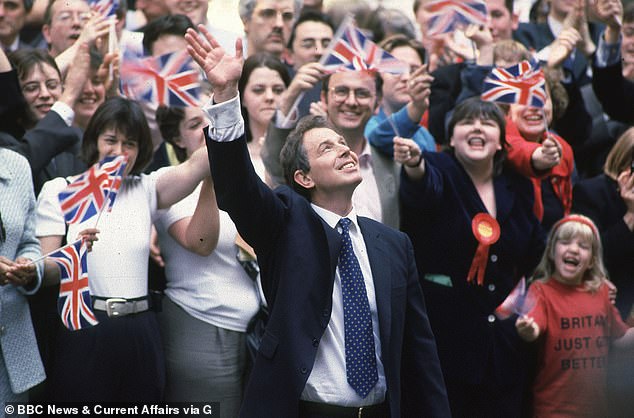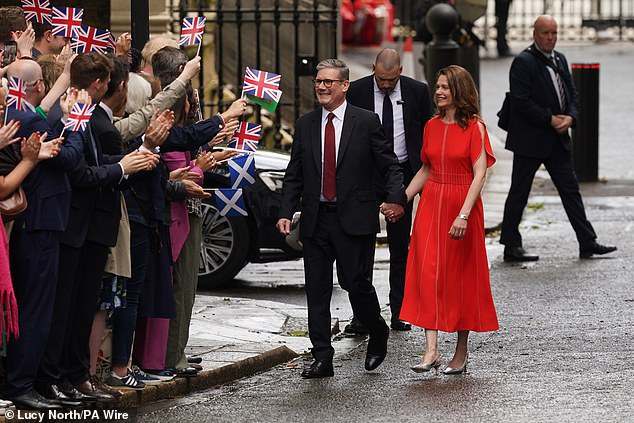The day after my 16th birthday in May 1997, I woke up to the news that Tony Blair had won the general election, ousting the Tories who had been in power since before I was born.
My head somewhat hazy from the cheeky teenage drinks I’d had with friends the night before, I remember hearing New Labour’s anthem, Things Can Only Get Better by band D:Ream, playing on the TV news as footage was broadcast of victory celebrations across the country. (It was a song I was familiar with, having seen the group as a support act to Take That in a concert a few years before.)
I liked Blair: I’d seen him interviewed on television as part of his spin doctor Alastair Campbell’s carefully curated campaign to present him as a prime minister-in-waiting – and I was aware he had a very high-achieving wife, Cherie, which impressed me no end.
While I won’t pretend to have been an expert in politics then (nor today), it was clear that this man was aligned with the aspirations of our working-class family: one determined to get on and better ourselves.
My dad would ridicule Blair for being ‘almost a Tory’, but I quickly realised that Blair and his party were willing to allow – even push – people like me to find a way to do well.
My dad was a chauffeur and my stepmother was a secretary turned HR executive. They put every penny they could save into buying a house in the nicest area of our gritty hometown of Crawley in West Sussex.
This meant that my two sisters, my stepbrother and I were able to go to the best state school in the area, have nice friends and for the most part stay on the right side of the tracks.
My siblings and I all had dreams of achieving more. In my early teens, I began a paper round – and was soon constantly late with my deliveries because I’d spent all my time reading the morning editions instead of dropping them off. That sparked my love of journalism – and I haven’t looked back.

Tony Blair arrives in Downing Street after his election victory in May 1997

Sir Keir Starmer arrives with his wife Victoria at Downing Street after his victory last year
A few months after my 16th birthday, I started studying for my A-Levels. Blair’s mantra had been ‘education, education, education’ – and suddenly the thought of going to university crossed my mind for the first time. Remember, as recently as 1990, only about 19 per cent of British school-leavers went to university – many from fee-paying institutions. Blair expanded this dramatically.
Nobody in my family had been to university before – and I have the fondest of memories being knee-deep in prospectuses as I planned my route into higher education. In September 1999, I went off to the University of East Anglia in Norwich to study linguistics.
I finally voted in a general election for the first time in 2001 – Labour, of course – in what proved to be a second landslide for Blair.
After graduating, I ticked the Labour box in 2005 and again in 2010, though of course David Cameron won that election in coalition with the Lib Dems. During the subsequent Labour leadership contest, and by then a working journalist, I interviewed both Miliband brothers who were desperate to come across as ‘relatable’.
In a moment that makes me cringe today, Ed insisted to me that his favourite Spice Girl was Geri Halliwell, while David showed me the label of his shirt to prove it was from the moderately priced high-street chain, Gap.
Still, once again, in May 2015, I voted Labour on my postal vote from Los Angeles, where I was working.

Farmers protest outside of Westminster last year following Labour’s tightening of the belt on land inheritance
By 2019, however, I couldn’t bring myself to back Jeremy Corbyn – a dreary socialist and a man I’ve described before as the opposite of aspirational. Instead, like many lifelong Labour voters, I held my nose and voted Tory for the first time: I liked Boris Johnson’s dynamic optimism and I’d admired his work as London mayor.
Fast forward to 2020, when Sir Keir Starmer became Labour leader. I had some hope that he could turn around ‘my’ party’s fortunes. As last year’s general election drew nearer, I hoped that I might be able to vote for Labour again but I couldn’t. Something about his party, and its hard-Left attitude to entrepreneurs and wealthy people, and its patronising attitudes towards the working class, made me uneasy. For the first time in my life, I abstained.

Mail columnist Katie Hind aged 16
And now, after a year in power, I can confidently say I will never vote Labour again.
Because the truth is that Starmer and his party have let down the 16-year-old me. It’s become clear they simply do not want people to be upwardly mobile: in fact, they detest people like me and my siblings who prefer hard work and bettering ourselves to sitting on the dole.
My older sister Natalie (she actually beat me to become the first in our family to go to university) and her husband, who was also educated at state school, work extremely hard to send their children to a fee-paying school and give them opportunities they didn’t have. They have foregone holidays to pay for my nephew and two nieces’ education – and their fourth child, now aged two, will be starting in the next few years.
Yet Britain became the only country in Europe to tax education when Starmer imposed 20 per cent VAT on independent-school fees – a brazen tax on aspiration and an ugly example of the politics of envy.
My sister and her husband already pay their taxes – now at record highs – to fund state schools: now they’re paying twice thanks to Starmer and his ‘Marxist’ education minister Bridget Phillipson.
For now at least, thanks to their parents’ hard work, my nephew and nieces won’t need to leave their schools – but, cruelly, thousands of other children already have, causing private schools to close and some state school classes to swell to unmanageable levels.
But Starmer’s anti-aspirational politics goes much further. Take his recent U-turn on sickness benefits. This week, new figures revealed that people ‘on the sick’ will soon be receiving £2,500 a year more than a full-time worker on minimum wage – £25,000 compared to £22,500. Some claimants, of course, get far more than that – a very comfortable lifestyle thanks to taxpayers.
Of course we need a safety net to those truly in need – but to me, the fact that you can get more on benefits than minimum wage is a clear sign that many of Starmer’s MPs want to trap people on benefits because it means they will carry on voting for them.
And, frankly, I despise this attitude. As someone with a staunch work ethic, who has rarely taken a sick day in my life, the idea that thousands of young people are making such a choice is worse than depressing – it’s unforgivable.
Chancellor Rachel Reeves’s decision at the last budget to raise employers’ National Insurance was, whatever she says, a tax on jobs – and thus on anyone who wants to get ahead in life.
As for Ed Miliband, who made out to me back in 2010 that he was such a man of the people, he seems determined to pursue mad Net Zero policies that hit every hard-working person in the pocket when we pay our heating bills or fill our cars.
After a year of watching Starmer do one thing after another against anyone with aspirations, I’m beyond disappointed. He and his party won’t get my vote again – nor my siblings’, either.
The late 1990s, when my generation came of age, was an optimistic time. Today, that joy is long-gone – along with my support for the Labour party.












